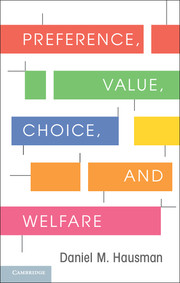Book contents
- Frontmatter
- Contents
- Figures
- Preface
- 1 Preferences, Comparative Evaluations, and Reasons
- Part I Preferences in Positive Economics
- Part II Preferences, Welfare, and Normative Economics
- 7 Preference Satisfaction and Welfare
- 8 Preferences in Welfare Economics
- Part III Psychology, Rational Evaluation, and Preference Formation
- References
- Index
7 - Preference Satisfaction and Welfare
from Part II - Preferences, Welfare, and Normative Economics
Published online by Cambridge University Press: 05 June 2012
- Frontmatter
- Contents
- Figures
- Preface
- 1 Preferences, Comparative Evaluations, and Reasons
- Part I Preferences in Positive Economics
- Part II Preferences, Welfare, and Normative Economics
- 7 Preference Satisfaction and Welfare
- 8 Preferences in Welfare Economics
- Part III Psychology, Rational Evaluation, and Preference Formation
- References
- Index
Summary
This chapter argues that the satisfaction of preferences – even when preferences are informed, rational, and generally spruced up – does not constitute well-being. Economists are mistaken when they make claims such as “Policy x is deemed better than policy y for an individual if and only if, given the opportunity, the individual would choose x over y” (Gul and Pesendorfer 2008, p. 24). In assessing preference-satisfaction theories of well-being, it is crucial to understand correctly what is meant by “preference.” For example, if preference were defined as a ranking in terms of expected benefit, then it would be true by definition that what individuals prefer would coincide with what they believed was good for them. If people’s expectations were correct, preference satisfaction would coincide with welfare. And if people choose what they prefer, then, as Gul and Pesendorfer maintain, they always choose what is best for them.
In the investigation of preference-satisfaction theories of welfare, I shall interpret preferences as economists do – that is, as total subjective comparative evaluations. There is no plausible alternative. The everyday sense of preferences as overall comparative evaluations is unsatisfactory for the purposes of a theory that identifies welfare and preference satisfaction, because it implies that when moral commitments conflict with preference, adhering to moral commitment always makes individuals worse off. Although doing what is right may not always be good for people, it should not always be bad for people whose preferences lead elsewhere. If one wants to define welfare in terms of preference, then one should take preferences to be total comparative evaluations.
- Type
- Chapter
- Information
- Preference, Value, Choice, and Welfare , pp. 77 - 87Publisher: Cambridge University PressPrint publication year: 2011
- 1
- Cited by



